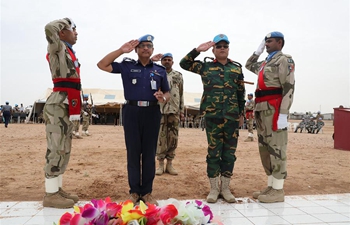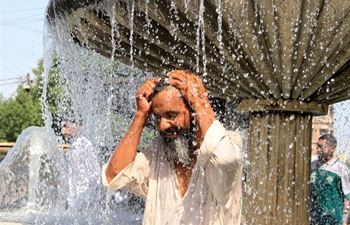GAZA, May 30 (Xinhua) -- Although Egypt on Tuesday managed to end daylong clashes between Palestinians factions in Gaza and Israel, Palestinian observers expect it is possible that new rounds of violence may erupt soon.
Political observers believe that larger military confrontations may occur as long as the Hamas-ruled enclave is placed under a tight Israeli blockade.
Islamic Hamas movement, which rules Gaza, and the Islamic Jihad group claimed responsibility for firing barrages of mortars and rockets from the Gaza Strip into Israel.
The two groups said that "firing mortars and rockets was a response to the Israeli aggression and its crimes against the Palestinian people and their men of resistance."
Israeli war jets also launched intensive successive airstrikes on the two groups' military facilities across the Gaza Strip.
Like always, the Egyptian intelligence intervened to reach understandings that would maintain a ceasefire agreement it sponsored in 2014 after an Israeli major offensive on Gaza.
"What we have seen yesterday is a normal result of weeks of tension on the borders between Gaza and Israel where dozens of Palestinians were killed during anti-Israel peaceful demonstrations," Gaza-based political analyst, Adnan Abu Amer, told Xinhua.
Abu Amer added that Hamas and the Islamic Jihad decided to respond with minimal capabilities by firing mortars in an effort to prevent Israel from imposing new "rules of engagement" based on unilateral deterrence.
He pointed out that battle of Hamas and Islamic Jihad with Israel is based on scoring points, "which keeps all doors open for all possibilities."
Abu Amer noted that the success of the Egyptian mediation efforts to put a swift end to the tension highlights the unwillingness of the Palestinian factions and Israel to go for an open confrontation for political, internal, regional and international considerations.
Israel launched three major wars on the Gaza Strip between 2008 and 2014. The offensives left thousands of Palestinians dead and injured, in addition to the destruction of the majority of Gaza's infrastructure.
After the 2014 offensive, Egypt mediated a cease-fire between Hamas and Israel which appeared satisfactory for both sides.
"All the indicators in the past few weeks show that a military confrontation between Gaza militant groups and Israel is looming," Hani Habib, a writer and political analyst from Gaza, told Xinhua.
Habib highlighted that the worsening economic crisis in the Gaza Strip, which is caused by Israel's 11-year blockade, as well as the high levels of poverty and unemployment are among the reasons of igniting new rounds of violence between Gaza and Israel.
"In the absence of a certain consensus, whether Palestinian-Palestinian or Palestinian-Israeli, to control the situation on the ground, things are likely to further escalate," Habib said, adding that such an escalation can lead both sides to undesirable ends.
"Although neither Hamas nor Israel is rushing for a new confrontation, there might be other parties that have an interest for a military escalation," Habib said.
Frequent rounds of tension with Israel in the Gaza Strip cannot be separated from the unprecedented accumulation of humanitarian crises and the acute lack of basic services for Gaza's 2 million populations.
A recent United Nations report warned that Gaza would be an unlivable place in 2020 due to shortage of water resources, lack of jobs and deterioration in medical, social and educational services.
Israel imposed a tight blockade on the Gaza Strip in 2007 and considered the coastal enclave a hostile entity right after Hamas militants violently seized control of the territory and routed security forces loyal to Palestinian President Mahmud Abbas.
The blockade was one of the main reasons why the Palestinians in Gaza launched mass anti-Israel protests, known as "Great March of Return" on March 30.
At least 118 Palestinian protesters have been killed by Israeli fire during the ongoing rallies which are being held almost on daily basis along Gaza-Israel border fence.
The rallies demand the return of Palestinians refugees who were forced to leave their cities during the Arab-Israeli war in 1948 as well as lifting the Israeli blockade.
Media reports, especially in Israel, have recently focused on undeclared U.S.-backed talks between several regional parties to find solutions to the worsening humanitarian crisis in the Gaza Strip.
"The recent round of violence in Gaza might be an introduction to a long-term truce that has been carefully prepared," Gaza-based political analyst Aktam Atallah said.
Atallah believes that Israel wants to militarize the confrontation in the Gaza Strip to cover up the peaceful Great March of Return and push for a period of calm according to its own terms under regional auspices.
"The Palestinian factions responded to reject the deterrence equation Israel was trying to impose, no matter what the consequences of the escalation might be," he said.

















